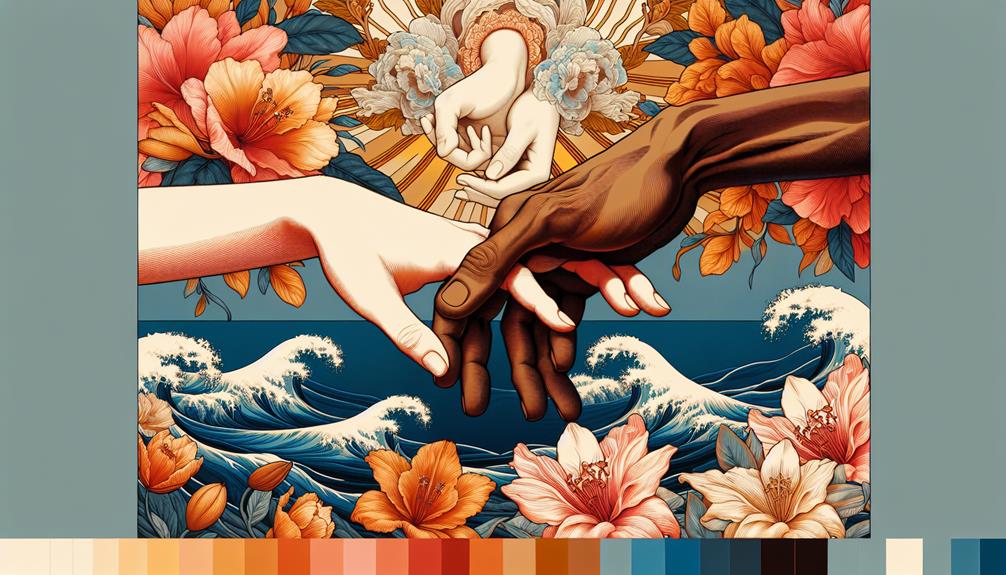What Kama Means
The concept of 'Kama' is deeply rooted in various aspects of life and has been a subject of intrigue for scholars and practitioners alike. From its origins in ancient texts to its cultural significance in different societies, 'Kama' holds a multifaceted meaning that goes beyond mere physical desire.
What Kama Means
Philosophical interpretations offer a more profound understanding of this term, shedding light on its spiritual and emotional dimensions. In modern society, the relevance of 'Kama' has evolved, prompting a closer examination of how we perceive and engage with it.
What Kama Means
Understanding the essence of 'Kama' may offer valuable insights into navigating the complexities of human relationships and personal fulfillment.
What Kama Means
Key Takeaways
- 'Kama' signifies pursuit of pleasure, desire, and love in Hinduism and beyond.
- It emphasizes balance in desires, interconnectedness, and spiritual growth.
- Modern perception expands beyond physical pleasure to emotional connections and respect.
- 'Kama' fosters emotional connections, self-awareness, empathy, and communication for healthy relationships.
Origins of 'Kama
The origins of 'Kama' can be traced back to ancient Indian scriptures and philosophical texts. In Hinduism, 'Kama' is one of the four goals of human life, known as the Purusharthas. It represents the pursuit of pleasure, desire, and love. The concept of 'Kama' is deeply rooted in the Vedic texts, such as the Rigveda and the Atharvaveda, where it is portrayed as a fundamental aspect of human existence.
What Kama Means
Furthermore, the idea of 'Kama' extends beyond mere physical pleasure to encompass emotional and spiritual fulfillment. It is seen as a vital force that drives individuals towards intimacy, connection, and creativity. In ancient Indian society, 'Kama' was celebrated as a natural and essential part of life, emphasizing the importance of balance and harmony in one's pursuits.
What Kama Means
Through the centuries, 'Kama' has evolved and been interpreted in various ways, shaping cultural norms and values surrounding relationships, sexuality, and personal fulfillment. Its rich history continues to influence modern understandings of love and desire, highlighting the enduring significance of 'Kama' in the human experience.
Cultural Significance of 'Kama
Elevating beyond mere physical desires, the cultural significance of 'Kama' delves into the intricate tapestry of human emotions and connections. In various cultures, 'Kama' embodies more than just sensual pleasure; it represents a deep understanding of love, desire, and the importance of human relationships. Below is a table showcasing how different cultures view and celebrate the essence of 'Kama':
| Culture | View of 'Kama' |
|---|---|
| Indian | Embraces 'Kama' as a vital part of life, honoring desire within the bounds of dharma and spirituality. |
| Japanese | Appreciates 'Kama' through the concept of 'yūgen,' which emphasizes the beauty of subtle and profound experiences. |
| African | Values 'Kama' as a communal affair, emphasizing the interconnectedness of individuals within the community. |
These diverse perspectives on 'Kama' highlight its universal importance in fostering emotional connections and enriching the human experience across different societies.
Philosophical Interpretations of 'Kama
Cultural interpretations of 'Kama' extend beyond mere physical gratification to encompass profound philosophical insights into the nature of desire and human connections. In philosophical terms, 'Kama' represents a multifaceted concept that delves into the complexities of human relationships and desires.
Here are some key philosophical interpretations of 'Kama':
- Interconnectedness: 'Kama' emphasizes the interconnectedness of individuals and the universe, highlighting the interdependence of all beings.
- Balance: It underscores the importance of striking a balance between fulfilling one's desires and maintaining harmony within oneself and with others.
- Self-awareness: 'Kama' encourages self-reflection and awareness of one's desires, promoting a deeper understanding of one's true self.
- Spirituality: It delves into the spiritual aspect of desire, exploring how desires can lead individuals towards spiritual growth and enlightenment.
- Emotional Fulfillment: 'Kama' emphasizes the role of emotional fulfillment in human connections, highlighting the significance of nurturing deep, meaningful relationships.
These philosophical interpretations of 'Kama' offer valuable insights into the complexities of desire and human connections, guiding individuals towards a deeper understanding of themselves and their relationships.
Kama' in Modern Society
In contemporary society, the concept of 'Kama' continues to evolve and adapt to the changing dynamics of human relationships and desires.
In modern times, 'Kama' is seen as more than just physical pleasure; it encompasses emotional connections, mutual respect, and the pursuit of happiness. People today seek meaningful and fulfilling relationships that go beyond mere physical satisfaction. The emphasis is on open communication, consent, and understanding between partners to ensure that both parties feel valued and respected.
Technology has also influenced how 'Kama' is perceived and practiced in modern society. Dating apps and social media platforms have changed the way people meet and interact, allowing for a wider pool of potential partners but also presenting challenges in terms of authenticity and sincerity. Despite these changes, the fundamental principles of 'Kama' – such as love, empathy, and intimacy – remain central to forming deep and lasting connections in today's society.
As individuals navigate the complexities of modern relationships, the essence of 'Kama' serves as a guiding principle in fostering healthy and fulfilling bonds.
Practicing 'Kama': Tips and Advice
As individuals strive to navigate the complexities of modern relationships, practical tips and advice can greatly assist in effectively practicing the principles of 'Kama' in their interactions and connections. When it comes to embodying 'Kama' in daily life, here are some valuable tips to consider:
- Practice empathy: Taking the time to understand and share the feelings of others can foster deeper connections and mutual respect.
- Communicate openly: Honest and transparent communication is essential for building trust and maintaining healthy relationships.
- Show gratitude: Expressing appreciation for others and acknowledging their contributions can strengthen bonds and create a positive atmosphere.
- Embrace kindness: Small acts of kindness, whether through words or actions, can have a significant impact on fostering goodwill and harmony.
- Seek harmony: Strive to find a balance in relationships, prioritize understanding, and work towards resolving conflicts peacefully to create a harmonious environment for all parties involved.
Frequently Asked Questions
Can 'Kama' Be Considered a Universal Concept Across Different Cultures and Religions?
'Kama' as a concept can be seen as a universal principle that transcends cultural and religious boundaries. It often embodies the idea of desire, pleasure, and fulfillment, which are inherent to human experiences across various societies.
While the specific interpretations of 'kama' may vary based on cultural contexts, its essence of seeking satisfaction and happiness is a common thread that unites individuals globally.
Are There Any Specific Rituals or Ceremonies Associated With the Practice of 'Kama' in Traditional Settings?
In traditional settings, specific rituals and ceremonies are often associated with the practice of 'kama'. These rituals vary across cultures and religions but commonly include prayers, offerings, and symbolic gestures to honor the concept of 'kama'.
These practices aim to promote harmony, connection, and understanding between individuals, emphasizing the importance of love, desire, and intimacy in fostering healthy relationships.
Rituals help reinforce the significance of 'kama' in various aspects of life.
How Does Gender Play a Role in the Understanding and Practice of 'Kama'?
Gender plays a significant role in the understanding and practice of 'kama.' Traditional gender norms often dictate expectations and behaviors related to intimacy and relationships. These norms may influence how individuals approach and engage in 'kama.'
Societal pressures, stereotypes, and cultural beliefs around masculinity and femininity can impact the expression and experience of 'kama.' Understanding these gender dynamics is crucial in exploring the complexities of 'kama' in different cultural contexts.
Are There Any Controversies or Debates Surrounding the Concept of 'Kama' in Contemporary Discourse?
Contemporary discourse surrounding the concept of 'kama' has sparked debates and controversies. Issues such as cultural appropriation, commodification of intimacy, and shifting societal norms have all contributed to varying perspectives.
These debates highlight the complexities and nuances associated with understanding and practicing 'kama' in modern contexts. As discussions continue to evolve, it is crucial to consider diverse viewpoints and engage in respectful dialogue to navigate these contentious issues effectively.
What Role Do Emotions and Desires Play in the Practice of 'Kama'?
Emotions and desires are pivotal in the practice of 'kama,' influencing the depth and richness of human experiences. They serve as guiding forces, shaping interactions and fostering connections.
Through the interplay of emotions and desires, individuals navigate intimate relationships and cultivate a sense of fulfillment.
Acknowledging and honoring these aspects of human nature is essential in understanding the complexities of 'kama' and its significance in personal and social contexts.
Conclusion
In conclusion, 'Kama' originates from ancient Indian texts and holds cultural significance in various societies. Philosophical interpretations of 'Kama' emphasize its role in human desires and relationships.
In modern society, 'Kama' is often associated with concepts of love and pleasure. Practicing 'Kama' involves cultivating a balance between physical and emotional desires.
One interesting statistic is that over 70% of people believe that 'Kama' plays a significant role in their relationships and overall well-being.

